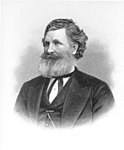
The Confederate States of America (CSA), commonly referred to as the Confederate States (C.S.), the Confederacy, or the South, was an unrecognized breakaway republic in the Southern United States that existed from February 8, 1861, to May 9, 1865. The Confederacy comprised eleven U.S. states that declared secession and warred against the United States during the American Civil War. The states are South Carolina, Mississippi, Florida, Alabama, Georgia, Louisiana, Texas, Virginia, Arkansas, Tennessee, and North Carolina.

Robert Augustus Toombs was an American politician from Georgia, who was an important figure in the formation of the Confederacy. From a privileged background as a wealthy planter and slaveholder, Toombs embarked on a political career marked by effective oratory, although he also acquired a reputation for hard living, disheveled appearance, and irascibility. He was identified with Alexander H. Stephens's libertarian wing of secessionist opinion, and in contradistinction to the nationalist Jefferson Davis, Toombs believed a Civil War to be neither inevitable or winnable by the South.

Alexander Hamilton Stephens was an American politician who served as the first and only vice president of the Confederate States from 1861 to 1865, and later as the 50th governor of Georgia from 1882 until his death in 1883. A member of the Democratic Party, he represented the state of Georgia in the United States House of Representatives before and after the Civil War.

John Jordan Crittenden was an American statesman and politician from the U.S. state of Kentucky. He represented the state in the U.S. House of Representatives and the U.S. Senate and twice served as United States Attorney General in the administrations of William Henry Harrison, John Tyler, and Millard Fillmore. He was also the 17th governor of Kentucky and served in the state legislature. Although frequently mentioned as a potential candidate for the U.S. presidency, he never consented to run for the office.

The Constitutional Union Party was a United States third party active during the 1860 elections. It consisted of conservative former Whigs, largely from the Southern United States, who wanted to avoid secession over the slavery issue and refused to join either the Republican Party or the Democratic Party. The Constitutional Union Party campaigned on a simple platform "to recognize no political principle other than the Constitution of the country, the Union of the states, and the Enforcement of the Laws".

John Bell was an American politician, attorney, and planter who was a candidate for President of the United States in the election of 1860.

The Confederate States Congress was both the provisional and permanent legislative assembly of the Confederate States of America that existed from 1861 to 1865. Its actions were, for the most part, concerned with measures to establish a new national government for the Southern proto-state, and to prosecute a war that had to be sustained throughout the existence of the Confederacy. At first, it met as a provisional congress both in Montgomery, Alabama, and Richmond, Virginia. As was the case for the provisional Congress after it moved to Richmond, the permanent Congress met in the existing Virginia State Capitol, a building which it shared with the secessionist Virginia General Assembly.

Horatio Seymour was an American politician. He served as Governor of New York from 1853 to 1854 and from 1863 to 1864. He was the Democratic Party nominee for president in the 1868 United States presidential election, losing to Republican Ulysses S. Grant.
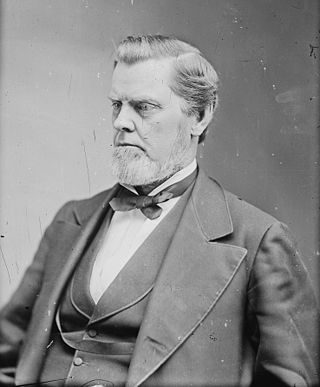
Benjamin Harvey Hill was a politician whose career spanned state and national politics, and the Civil War. He served in the Georgia legislature in both houses. Although he had opposed secession in 1860, he represented Georgia as a Confederate senator during the conflict.

Texas declared its secession from the Union on February 1, 1861, and joined the Confederate States on March 2, 1861, after it had replaced its governor, Sam Houston, who had refused to take an oath of allegiance to the Confederacy. As with those of other states, the Declaration of Secession was not recognized by the US government at Washington, DC. Some Texan military units fought in the Civil War east of the Mississippi River, but Texas was more useful for supplying soldiers and horses for the Confederate Army. Texas' supply role lasted until mid-1863, when Union gunboats started to control the Mississippi River, which prevented large transfers of men, horses, or cattle. Some cotton was sold in Mexico, but most of the crop became useless because of the Union's naval blockade of Galveston, Houston, and other ports.

The Confederate government of Kentucky was a shadow government established for the Commonwealth of Kentucky by a self-constituted group of Confederate sympathizers and delegates sent by Kentucky counties, during the American Civil War. The shadow government never replaced the elected government in Frankfort, in which the state legislature had strong Union sympathies while the governor was pro-Confederate. Neither was it able to gain the whole support of Kentucky's citizens; its jurisdiction extended only as far as Confederate battle lines in the Commonwealth, which at its greatest extent in 1861 and early 1862 encompassed over half the state. Nevertheless, the provisional government was recognized by the Confederate States of America, and Kentucky was admitted to the Confederacy on December 10, 1861. Kentucky, the final state admitted to the Confederacy, was represented by the 13th (central) star on the Confederate battle flag.

The 1966 Georgia gubernatorial election was held on November 8, 1966. After an election that exposed divisions within the Georgia Democratic Party, segregationist Democrat Lester Maddox was elected Governor of Georgia. The voting also brought future President Jimmy Carter to statewide prominence for the first time. The election was the closest in Georgia gubernational history; Republican candidate Bo Callaway won a plurality of the popular vote, but lost the contingent election in the Georgia General Assembly to Maddox. It was also the first time since 1916 that the Republican Party contested a gubernatorial election.
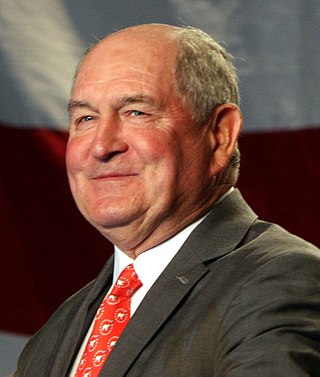
The 2002 Georgia gubernatorial election was held on November 5, 2002. Incumbent Democratic Governor Roy Barnes sought re-election to a second term as governor. State Senator Sonny Perdue emerged as the Republican nominee from a crowded and hotly contested primary, and he faced off against Barnes, who had faced no opponents in his primary election, in the general election. Though Barnes had been nicknamed "King Roy" due to his unique ability to get his legislative priorities passed, he faced a backlash among Georgia voters due to his proposal to change the state flag from its Confederate design.

The 1994 Georgia gubernatorial election occurred on November 8, 1994, to elect the next governor of Georgia from 1995 to 1999. Incumbent Democratic Governor Zell Miller, first elected in 1990, ran for a second term. In his party's primary, Miller received three challengers, but easily prevailed with just over 70% of the vote. The contest for the Republican nomination, however, was a competitive race. As no candidate received a majority of the vote, John Knox and Guy Millner advanced to a run-off election. Millner was victorious and received the Republican nomination after garnering 59.41% of the vote.

The 1862–63 United States Senate elections were held on various dates in various states, occurring during the American Civil War. As these U.S. Senate elections were prior to the ratification of the Seventeenth Amendment in 1913, senators were chosen by state legislatures. Senators were elected over a wide range of time throughout 1862 and 1863, and a seat may have been filled months late or remained vacant due to legislative deadlock. In these elections, terms were up for the senators in Class 1.

United States gubernatorial elections were held on November 8, 2022, in 36 states and three territories. As most governors serve four-year terms, the last regular gubernatorial elections for all but two of the seats took place in the 2018 U.S. gubernatorial elections. The gubernatorial elections took place concurrently with several other federal, state, and local elections, as part of the 2022 midterm elections.

The 1932 United States presidential election in North Carolina took place on November 8, 1932, as part of the 1932 United States presidential election. North Carolina voters chose thirteen representatives, or electors, to the Electoral College, who voted for president and vice president.
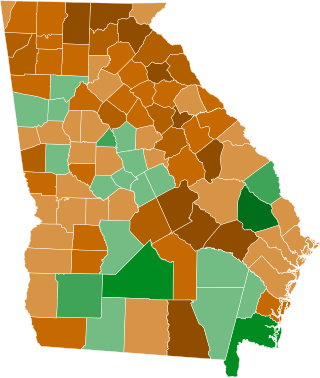
The 1851 Georgia gubernatorial election was held on October 6, 1851, to elect the governor of Georgia. Howell Cobb, nominee for the newly formed Constitutional Union Party, defeated the Southern Rights Candidate, Charles McDonald.

The 1861 Maryland gubernatorial election took place on November 6, 1861. It was held amid the early phases of the American Civil War and was contested between the Unionist Party's Augustus Bradford and the Democratic Party's Benjamin Chew Howard. Bradford supported the maintenance of the Union while Howard advocated for a peace treaty with the Confederacy. Concerned about pro-secession elements in the state, the federal government sent troops to supervise the vote and ordered electors to take an oath of loyalty to the Union. The election was won by Bradford with 68.8% of the votes.
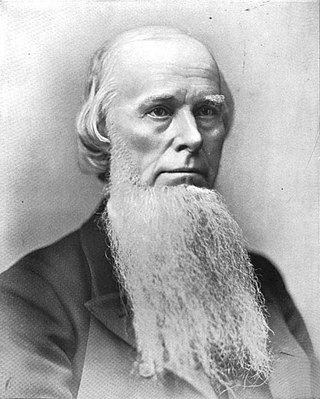
The 1861 Georgia gubernatorial election was held on October 2, 1861, in order to elect the Governor of Georgia. It was the first gubernatorial election in Georgia under the Confederate States of America and saw Democratic nominee and incumbent Governor Joseph E. Brown win a third term against Anti-Brown Democratic nominee Judge E. A. Nisbet.



